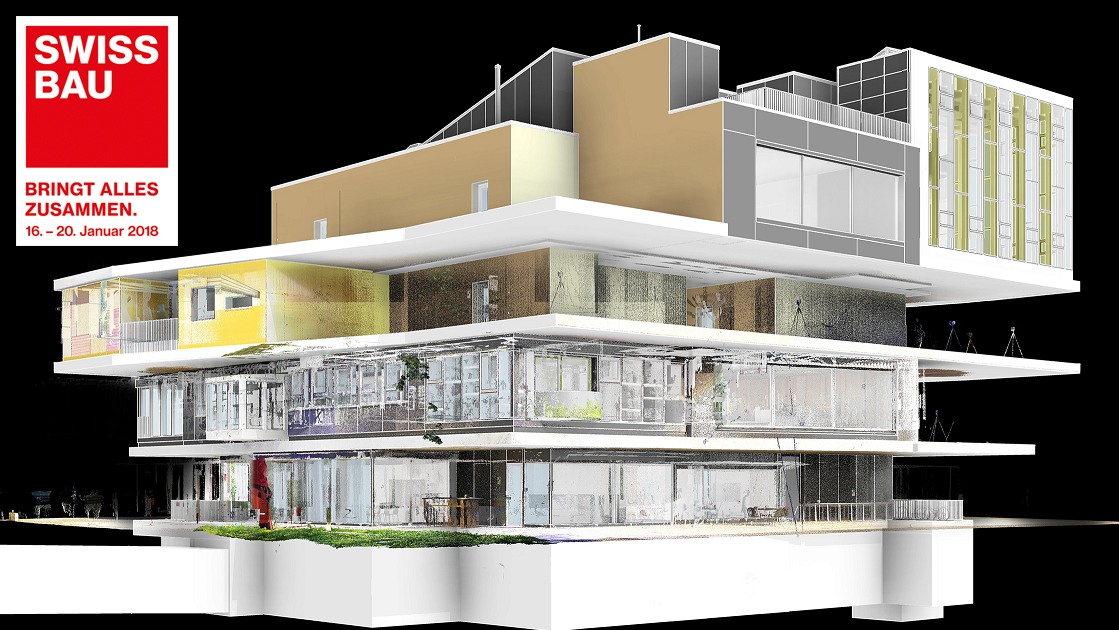NEST at Swissbau 2018
Real-world district for digital innovation
Dec 15, 2017 | STEPHAN KÄLIN
For the very first time, the "Innovation Lab", a special exhibition for digital transformations in the construction industry, will be held at Swissbau 2018 from 16 to 20 January. NEST, the modular research and demonstration platform from Empa and Eawag, will be presenting with its partners (in hall 1.1, booth L88) how digital construction is implemented in reality and exactly what kind of potential for digital innovation is offered by the set of demonstrators on the Empa campus in Dübendorf.

Digital technologies are changing the competitive landscape in many fields, and the same holds true in the building, energy, and mobility sectors. For companies, maintaining competitiveness requires constant experimentation with new, promising digital technologies – from artificial intelligence and Augmented Reality to the processing of Big Data. However, there is a lack of a suitable venue for the safe testing and development of new ideas under real-life conditions. The set of demonstrators on the Empa campus in Dübendorf offers just that: NEST gives researchers and companies the opportunity to try something new, both during the construction process as well as in the operation of a tangible, active building. The "Energy Hub" (ehub) allows for the experimentation with energy flows in districts and combines the building sector (NEST) with mobility, and the mobility demonstrator move where powertrain concepts and fuels made from renewable resources can be developed.
"Digital Hub" – a real-world urban district for digital innovation
As a new research and demonstration platform, Empa is now launching the "Digital Hub" (dhub) in cooperation with the SCCER FEEB&D and partners from research and industry. This links the three existing demonstrators at the digital level – and thereby connects the building sector with the energy and mobility sectors. This results in an instrument for the validation, demonstration, and development of digital solutions in a real district – with the goal of substantially accelerating the market entry of new products and services. Research and industry are invited to use this unique infrastructure to address their own questions. The "Innovation Lab" booth will present examples of this: the e-can suisse project shows how buildings and housing can communicate directly with a hydroelectric power plant and how the power production is tailored to actual consumption. The opportunities for digital operation of buildings and districts will also be presented.
"DFAB HOUSE" – digital fabrication and living
The NEST booth also offers insights into how the digital transformation is already a reality at NEST. The most obvious is the process in the "DFAB HOUSE" unit, which is currently being constructed: as part of the National Centre of Competence in Research (NCCR) Digital Fabrication, researchers from ETH Zürich, together with industry partners, transfer multiple digital construction technologies from the lab to the real world and construct a three-story unit with robots and 3D printers. Digital technologies will also be employed when DFAB HOUSE is inhabited starting in the summer of 2018. New smart home solutions and Internet of Things (IoT) technologies will be tested under the leadership of digitalSTROM AG and in cooperation with other Swiss companies.
"Water Hub" – rapid prototyping for the toilet of the future
In the "Water Hub", Eawag's research unit within NEST, digital technologies simplify the development of new processes for separating wastewater flows – with the goal of reusing water, recovering nutrients, and producing energy. The "Water Hub" separates the wastewater flows at the source and treats the individual lines decentrally. In so-called NoMix toilets at NEST, feces and urine are already collected separately in the toilet. The urine is stabilized and manufactured into the plant fertilizer Aurin; the feces is dried out and pressed into pellets. In the future, the pellets will be used to generate energy through combustion. With the application of 3D printed NoMix toilets, new ideas can be easily, quickly, and conveniently tested and reviewed. This type of rapid prototyping creates an independence of complex ceramic casting processes and introduces a flexibility in the development process of new procedures and technologies.
Swissbau Innovation Lab
Walls made by robots, 3D-printed toilets, and a robot that serves coffee: visit us at the Swissbau Innovation Lab in hall 1.1 at booth L88 and swap ideas with our experts.
Booth partners
-
Share
